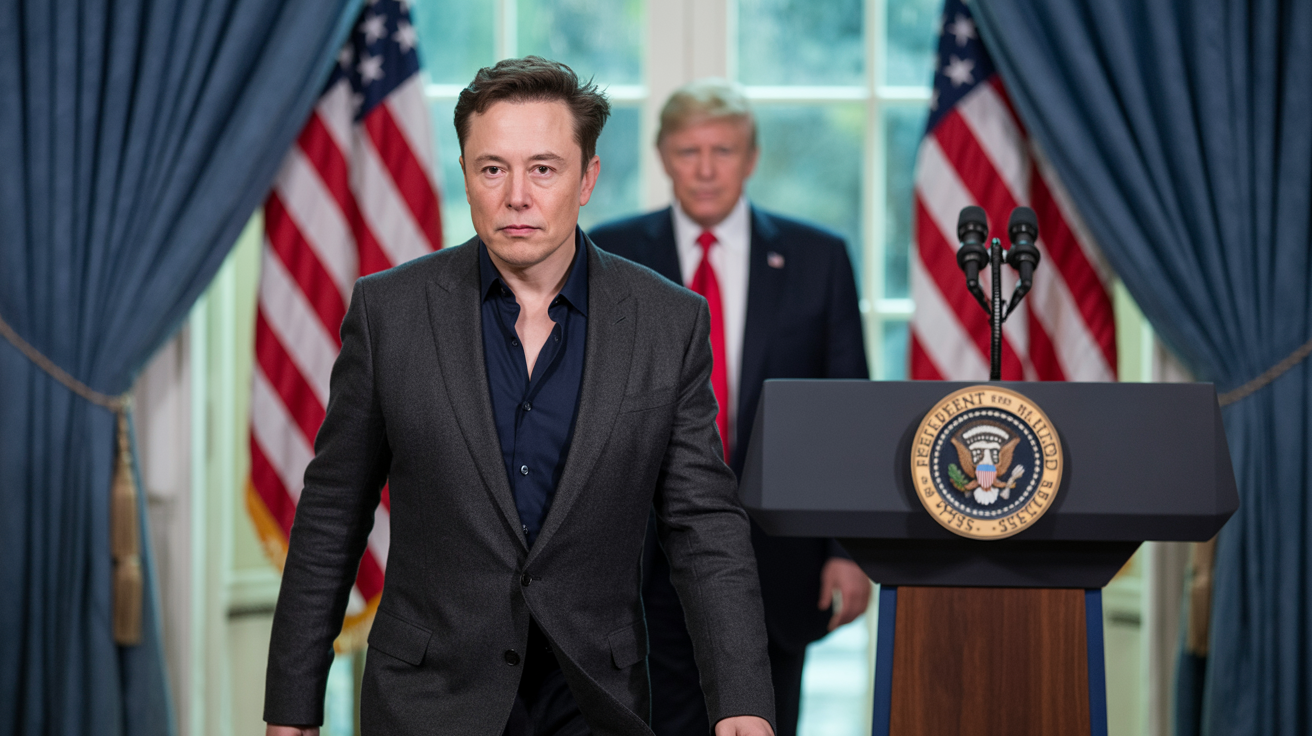Elon Musk has officially stepped down from his role in President Donald Trump’s administration, concluding his tenure as a “special government employee” and head of the Department of Government Efficiency (DOGE), a task force aimed at reducing federal spending.
Appointed for a maximum of 130 days annually, Musk reached this limit by late May following Trump’s January 20 inauguration. During his time, Musk oversaw efforts to streamline government operations, including a nearly 12% reduction in the federal civilian workforce, though the DOGE’s reported $175 billion in savings has faced scrutiny and fell well short of his ambitious trillion-dollar goal. Despite tensions, including his criticism of Trump’s “big beautiful bill” for risking a higher federal deficit, Musk thanked Trump on X and expressed hope that DOGE would continue to influence government culture. The White House confirmed his off-boarding began Wednesday evening, leaving the initiative’s future uncertain without his leadership, though his involvement left a lasting mark on both government operations and his public image.
Here is a deep news analysis structured around the 5Ws and 1H, followed by a creative takeaway and an evaluation of ethical reporting standards for this story.
5Ws1H Deep News Article Analysis
Who
- Elon Musk: Renowned tech entrepreneur, CEO of Tesla and SpaceX, and the world’s richest person. He served as a “special government employee” and head of the Department of Government Efficiency (DOGE) under President Donald Trump.
- Donald Trump: 47th President of the United States, who appointed Musk to lead a high-profile initiative to reduce federal bureaucracy and spending.
- Key Stakeholders: The White House, federal agencies, civil servants, Republican lawmakers, and the American public, all of whom were directly or indirectly affected by DOGE’s actions.
What
- Departure and Role: Musk officially stepped down from his role as head of DOGE, a task force created to cut federal spending and streamline government operations.
- Achievements and Controversies: Musk’s tenure saw a nearly 12% reduction in the federal civilian workforce (about 260,000 jobs), but the reported $175 billion in savings was far short of the trillion-dollar goal and has been widely questioned for accuracy.
- Policy Tensions: Musk publicly criticized Trump’s “big beautiful bill,” arguing it would increase the federal deficit and undermine DOGE’s cost-cutting objectives.
When
- Appointment: Musk was appointed following Trump’s inauguration on January 20, 2025.
- Tenure: As a special government employee, Musk was limited to 130 days of service annually. He reached this limit by late May, triggering his departure.
- Departure: Musk’s off-boarding process began Wednesday evening, May 28, 2025.
Where
- United States Federal Government: The primary setting for Musk’s work, focusing on Washington, D.C., but affecting federal agencies and employees nationwide.
- Public Forums: Musk announced his departure and shared his perspectives on X (formerly Twitter), and his criticisms were aired in national media interviews.
Why
- Purpose of DOGE: To reduce wasteful federal spending, streamline government operations, and “cut the federal government down to size”.
- Controversial Outcomes: DOGE’s aggressive cuts led to significant workforce reductions, but also service degradation, legal challenges, and public backlash.
- Tensions with Trump: Musk’s criticism of the “big beautiful bill” highlighted a rift over fiscal policy and the administration’s approach to spending and deficit reduction.
How
- Implementation: Musk used buyouts, early retirement incentives, and termination threats to reduce the federal workforce. DOGE also canceled contracts and grants deemed wasteful.
- Reporting and Accountability: DOGE’s reported savings were contested, with experts and independent analyses questioning the validity and transparency of the figures.
- Public and Political Reaction: The initiative faced resistance from federal employees, legal challenges from states, and disapproval from a majority of Americans in polls.
Creative Takeaway
Elon Musk’s tenure at the helm of DOGE was a bold experiment in applying private-sector efficiency to federal government operations. His approach—marked by aggressive cuts, public sparring with the President, and a relentless focus on “waste”—has left a lasting imprint on both the structure of the federal workforce and the political discourse around government reform. While the initiative fell short of its most ambitious targets, it sparked a national conversation about the role of government, the value of public service, and the limits of disruption in public administration. Musk’s departure signals a new chapter for both the administration and the tech mogul, who now returns his focus to his companies, but the legacy of DOGE—as both a symbol and a cautionary tale—will likely persist.
Ethical Standards of Reporting This News
Accuracy and Truthfulness
- Fact-Checking: Reporters must verify all claims, especially regarding savings figures and the impact of workforce reductions, using multiple credible sources and expert analyses.
- Transparency: Clearly distinguish between verified facts and contested claims, and disclose the limitations of available data (e.g., DOGE’s unverified savings).
Fairness and Impartiality
- Balanced Coverage: Present perspectives from all sides—Musk, Trump, federal employees, experts, and the public—to provide a comprehensive view of the story.
- Right to Reply: Offer affected parties (including the White House and federal agencies) the opportunity to respond to criticisms and allegations.
Independence
- Avoid Conflicts of Interest: Ensure reporting is free from political or commercial influence, especially when covering high-profile figures like Musk and Trump.
- Disclose Potential Biases: Acknowledge any relationships or affiliations that could affect coverage, and maintain editorial independence.
Minimizing Harm
- Sensitivity to Impact: Consider the consequences of reporting on federal employees who lost jobs or faced uncertainty due to DOGE’s actions, and avoid sensationalism.
- Privacy and Dignity: Respect the privacy and dignity of individuals affected by the story, especially those not in the public eye.
Accountability
- Correct Mistakes Promptly: If errors are identified, correct them quickly and transparently.
- Responsibility for Impact: Acknowledge the potential impact of reporting on public perception and government operations, and strive to minimize harm while fulfilling the duty to inform.
This analysis demonstrates how the Musk-DOGE story is both a significant political event and a case study in the complexities of government reform, media responsibility, and the challenges of ethical journalism.



